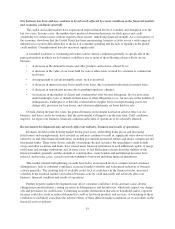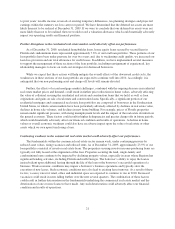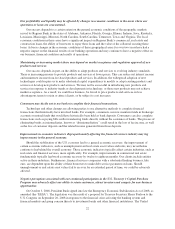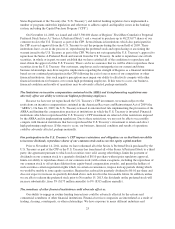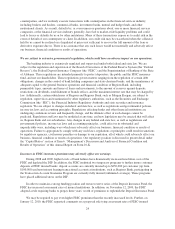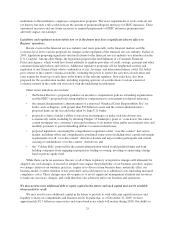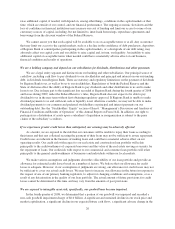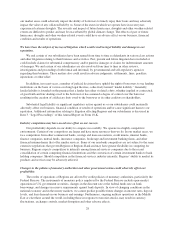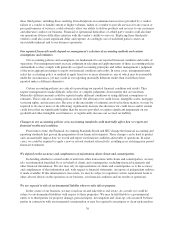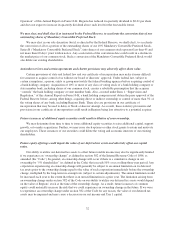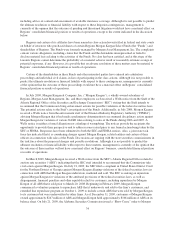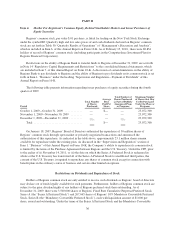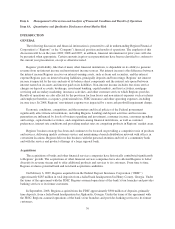Regions Bank 2009 Annual Report Download - page 43
Download and view the complete annual report
Please find page 43 of the 2009 Regions Bank annual report below. You can navigate through the pages in the report by either clicking on the pages listed below, or by using the keyword search tool below to find specific information within the annual report.We need to stay current on technological changes in order to compete and meet customer demands.
The financial services market, including banking services, is undergoing rapid changes with frequent
introductions of new technology-driven products and services. In addition to better serving customers, the
effective use of technology increases efficiency and may enable us to reduce costs. Our future success may
depend, in part, on our ability to use technology to provide products and services that provide convenience to
customers and to create additional efficiencies in our operations. Some of our competitors have substantially
greater resources to invest in technological improvements. We may not be able to effectively implement new
technology-driven products and services or be successful in marketing these products and services to our
customers.
We are subject to a variety of operational risks, including reputational risk, legal risk and compliance risk,
and the risk of fraud or theft by employees or outsiders, which may adversely affect our business and results of
operations.
We are exposed to many types of operational risks, including reputational risk, legal and compliance risk,
the risk of fraud or theft by employees or outsiders, and unauthorized transactions by employees or operational
errors, including clerical or record-keeping errors or those resulting from faulty or disabled computer or
telecommunications systems. Negative public opinion can result from our actual or alleged conduct in any
number of activities, including lending practices, corporate governance and acquisitions and from actions taken
by government regulators and community organizations in response to those activities. Negative public opinion
can adversely affect our ability to attract and keep customers and can expose us to litigation and regulatory
action. Actual or alleged conduct by Regions can result in negative public opinion about our other business.
Negative public opinion could also affect our credit ratings, which are important to our access to unsecured
wholesale borrowings.
If personal, non-public, confidential or proprietary information of customers in our possession were to be
mishandled or misused, we could suffer significant regulatory consequences, reputational damage and financial
loss. Such mishandling or misuse could include, for example, if such information were erroneously provided to
parties who are not permitted to have the information, either by fault of our systems, employees, or
counterparties, or where such information is intercepted or otherwise inappropriately taken by third parties.
Because the nature of the financial services business involves a high volume of transactions, certain errors
may be repeated or compounded before they are discovered and successfully rectified. Our necessary dependence
upon automated systems to record and process transactions and our large transaction volume may further
increase the risk that technical flaws or employee tampering or manipulation of those systems will result in losses
that are difficult to detect. We also may be subject to disruptions of our operating systems arising from events
that are wholly or partially beyond our control (for example, computer viruses or electrical or
telecommunications outages, or natural disasters, disease pandemics or other damage to property or physical
assets) which may give rise to disruption of service to customers and to financial loss or liability. We are further
exposed to the risk that our external vendors may be unable to fulfill their contractual obligations (or will be
subject to the same risk of fraud or operational errors by their respective employees as we are) and to the risk that
we (or our vendors’) business continuity and data security systems prove to be inadequate. The occurrence of any
of these risks could result in a diminished ability of us to operate our business (for example, by requiring us to
expend significant resources to correct the defect), as well as potential liability to clients, reputational damage
and regulatory intervention, which could adversely affect our business, financial condition and results of
operations, perhaps materially.
We rely on other companies to provide key components of our business infrastructure.
Third parties provide key components of our business operations such as data processing, recording and
monitoring transactions, online banking interfaces and services, Internet connections and network access. While
we have selected these third party vendors carefully, we do not control their actions. Any problems caused by
29


